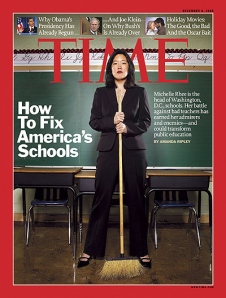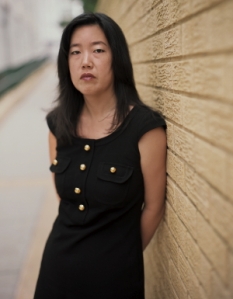Really Michelle Rhee!?
11/12/2010 5 Comments

Michelle Rhee wearing her signature black suit showing that she is "sweeping" away the bad teachers. (Photo: flackrabbit.com)
One can’t help but have a warm-fuzzy feeling when you hear Michelle Rhee talk about education. It is those warm and fuzzy feelings that have garnered Rhee the celebrity that she has gotten since she left her post as the Chancellor of DC Public Schools after 3 ½ years. (NOTE: Waiting for Superman made a pun against a former DCPS school leader who left after a short time. – But I digress) As sympathetic as I am in the need to reform schools, I am quite stunned at the apathy that Michelle Rhee has towards anyone that doesn’t support or embrace her agenda. Her apathetic tone has been a trend since she left her post at DC Public Schools. Before anyone embraces her or her drive to “reform” America’s education system, one must ask what really are Michelle Rhee’s motives?
“Yesterday’s election results were devastating, devastating. Not for me, because I’ll be fine, and not even for Fenty, because he’ll be fine, but devastating for the schoolchildren of Washington, D.C.”
This was a quote taken by the Washington Post on the day she found out that soon to be former Mayor Fenty lost his primary bid for re-election. In an interview with NPR she said, “I wish that the reporter would have actually expressed the entire sentiment and not just those words…[b]ecause what I said was, it was devastating because I have received calls from people inside the city and across the nation who are saying this is the worst thing that could’ve happened to school reform.” Even Rhee’s half-baked attempt to backtrack on her words still had an air of arrogance that shouldn’t surround a reformer, especially for the “civil rights issue of our time.” Reformers for civil rights issues like Martin Luther King never purported that the issue was hinged on one person, however Rhee has certainly set up that precedent.
In all fairness to Rhee, who wouldn’t feel arrogant? She was propped up as a hero in the movie Waiting for Superman. She has been made education advisor for the governor’s elect transition team in Florida. Oprah enthusiastically embraced Rhee on her show by saying, “I don’t have the know how to fix it…I have been saying from this platform that somebody needs to fix it. [A]nd the fact that you stepped up and said ‘I am the one to do it,’ God bless you.” Is arrogance what he need in the school reform movement?
Despite the fact that I disagree with many of Rhee’s policies, her apathy towards anyone who doesn’t agree with her agenda is the biggest sticking point with me. I am sure there are many educators across the country that would be willing to sit down and discuss the issues facing education with Rhee and come to a consensus. Unfortunately, Rhee’s goal is not to develop or create a consensus rather, it’s to develop a national competition on who is right, and who is wrong. She is creating national competition on who can be labelled education reformers and who are the members of the status quo. The most alarming thing about this competition is that she is participating in a competition that she feels she can invariably win. Why? Because she has the backing and support of big names with large sums of money like Bill Gates, Barack Obama, and Oprah who believes that Rhee has the “solution” to the problem in education. To add to the alarming factor, she believes that competition is acceptable in the education – even among children. She was quoted saying, “We have become a little too obsessed about making kids feel good about themselves…[w]e have lost the competitive spirit.” Is the competition what we need to change the American school system for the better?
“After the shock of Fenty’s loss, it became clear to me that the best way to keep the reform going in the D.C. schools was for me to leave my job as chancellor….But I felt that Mayor-elect Vincent Gray should have the same ability that Fenty had to appoint his own chancellor. And I knew I had become a lightning rod and excuse for the anti-reformers to oppose the changes that had to be made.” (Newsweek Editorial)
Really Michelle Rhee!? “Anti-reformers oppose the changes that had to be made.” It is that inflammatory and self-serving rhetoric that spurred the opposition against Michelle Rhee. Education is a consequence of and rooted in democracy. In other words, the stakeholders must be represented in the decisions that are being made throughout the school district. The mere fact that the stakeholders are demanding that they are to be heard is not a function of being an anti-reformer but of being an anti-“RHEE”former. Rhee should not be allowed to say, “I know people say I wasn’t good enough at building consensus, but I don’t think consensus can be the goal” on one hand and then appear on Oprah or purport on her new “Student’s First” website that the mission is to build a national movement to defend the interests of children. Are the parents integral to the success of children, therefore they the first defence in looking out for the interests of them? Aren’t the teachers that work with them day in and day out looking out for the interests of children? It is unfair for Michelle Rhee to vilify and stifle the voices of the stakeholders in the name of her version of reform.
Really Michelle Rhee!? I think the most ironic thing about her fame especially on the hills of her Student’s First website launch is that she is going to “transform education” by creating a special interest or lobbying group? (I hope that everyone reading took a few moments to let that settle in.) Isn’t this same person who tarnishes teacher’s unions for being a special interest group? Isn’t this the same person who in her Newsweek editorial, argued that even textbook manufacturers shape the agenda in education reform? However, it is not ironic to believe that her Student’s First organization is no better than the teacher’s union or the textbook manufacturer simply because she puts the word STUDENT in the title. She even asserted that school board meetings rarely discuss children, however her agenda includes mayoral control, merit-based pay for teachers, and increased accountability based on test scores. Where is the mention of children? Aren’t these just bureaucratic policies towards education? This is the same bureaucracy that Rhee is against.
Really Michelle Rhee!? This “reformer” clearly has a difficult time staying consistent. In her Newsweek editorial she said, “I did a particularly bad job letting the many good teachers know that I considered them to be the most important part of the equation. I should have said to the effective teachers, ‘You don’t have anything to worry about. My job is to make your life better, offer you more support, and pay you more.’ In other words, hindsight ‘I should have been nicer to teachers.’” However, in her speech in Sacramento she once again antagonized ALL teachers by asserting that teacher training schools are filled with the “lowest performing students” – better students choose other careers. Once again, Rhee failed to discuss the nuances of some of the better Schools of Education around the country including the one of her alma maters, Harvard University. In that one statement she debased a whole segment of current teachers and future teachers who went to teacher training schools –many of you reading this blog post. (Full Disclosure: I went to a teacher training school too.) However, teachers around the country are supposed to rally behind her in her brand of school reform.
After reading and listening to Michelle Rhee it has become very difficult for me to have any warm-fuzzy feelings about her or her agenda. Contrary to her belief, I do want the best for my students and I am sure the educators reading this blog post do too. It is in that vein, that I can never support someone so condescending and self-serving as Rhee has become. Oprah may be a successful media mogul – successfully endorsing books – but I am not quick to jump on the Oprah bandwagon here. In the end, I have found that Rhee’s “Student’s First” organization is nothing but a platform for Michelle Rhee to pontificate on a national scale. Her organization will do no more to serve the needs of children than the teacher’s union, the textbook manufacturer, and bureaucrats that she lambastes in the media. The organization is not about students; it’s about Michelle. That’s fine! However, don’t insult the intelligence of many educators in the meantime. Really Michelle Rhee!? We don’t need a queen; we need a leader!
Late Add
Let’s just say for the sake of conversation that her “reforms” are “well-intentioned” and in the spirit of students. Here is some data she cannot dispute:
- She will still be the wife of a prominent politician.
- She will still make a lot of money with her “Students First” organization.
- She still made $275,000/year as chancellor of DCPS.
- She makes good money from her television appearances, movie appearances, and her work in Florida as Hess’ transition team in Florida.
- Because of her wealth she has the option to send her children to private school.
- AND if her “reforms” crash and burn because of her untested “reforms,” alienation of educators, and apathy towards anyone who disagrees with her including her stake holders, she will STILL have all the above, and the parents, community members, and students will still lose. Really Michelle Rhee!?







